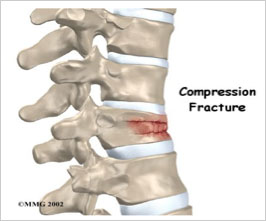
Vertebral Compression Fracture
What is a vertebral compression fracture?
The word “vertebral” has to do with the back bones, which doctors call the “vertebrae”. A “fracture” is another word for a broken bone. A vertebral compression fracture is when a back bone breaks by collapsing.

Vertebral compression fractures happen most often in people who have osteoporosis. Osteoporosis is a disease that makes the bones weak.
A common type of vertebral compression fracture is lumbar compression fracture. The word “lumbar” refers to the lower back.
What are the symptoms of a vertebral compression fracture?
Most people with a vertebral compression fracture have no symptoms. They find out they have it after their doctor does an X-ray of their chest or belly for another reason.
When a vertebral compression fracture causes symptoms, it causes back pain. The pain usually starts suddenly after a fall or after bending, coughing, or lifting. But sometimes the pain starts slowly. The pain can be dull or sharp, and often spreads to the belly.
Over time, people with vertebral compression fractures, especially lumbar compression fractures can:
- Get shorter (lose height)
- Get a bent posture with a hunched back
Will I need tests?
Yes. To check if you have a vertebral compression fracture, your doctor will order an X-ray. He or she will also do other tests to see if another condition caused your fracture. These can include blood tests, urine tests, or imaging tests. Imaging tests create pictures of the inside of the body.
f you have a vertebral compression fracture, your doctor will probably order bone density testing. Bone density testing is a way for your doctor to measure how strong your bones are. The test used most often to measure bone density is a special kind of X-ray called a “DXA test.”
How are vertebral compression fractures treated?
Treatment for a vertebral compression fracture involves different parts.
Your doctor will treat your pain. Depending on how severe your pain is, your doctor can treat it with:
- Strong pain medicines
- Over-the-counter pain medicines
- Medicines that are used to treat osteoporosis, but can also relieve pain
- Other treatments that are sometimes used for vertebral compression fractures are procedures called “vertebroplasty” and “kyphoplasty.” These involve putting a cement material or device into the collapsed back bone.
Your doctor will also treat your osteoporosis. Long-term osteoporosis treatment includes:
- Medicines – Doctors usually treat osteoporosis with medicines called bisphosphonates.
- Lifestyle changes – Your doctor will talk with you about ways to keep your bones as healthy as possible. He will probably recommend that you stop smoking (if you smoke) and that you should not drink too much alcohol. You should also eat a healthy diet with enough calcium and vitamin D.
- Exercise – It’s important to be active for at least 30 minutes a day, on most days of the week. “Weight-bearing” exercise, such as walking, is best. Weight-bearing exercise means that your feet and legs support your weight.
When will the pain from my fracture get better?
For most people, the pain will get better in 4 to 6 weeks. But people can have pain that lasts up to 3 months.
Can I do anything to improve the healing process?
To help with healing, you can follow all of your doctor’s instructions. This will probably include doing gentle back stretches while your fracture is healing, and other back exercises when your pain gets better. To learn which stretches and exercises to do, your doctor might have you work with a physical therapist (exercise expert).
It’s important to be active as soon as possible after your pain gets better. Being active will help keep your back and bones as strong as possible.
When should I call my doctor?
After treatment, your doctor will tell you when to call him or her. In general, you should call him if you:
- Have severe pain, or pain that gets worse
- Have numbness or weakness in your legs or feet
- Cannot control your bladder or bowels
